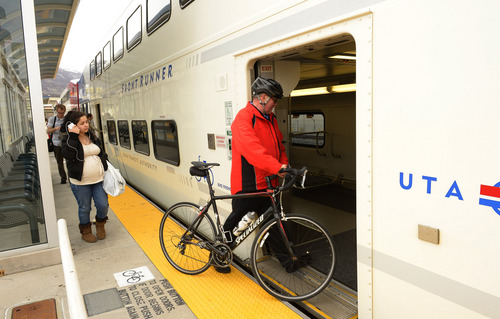This is an archived article that was published on sltrib.com in 2014, and information in the article may be outdated. It is provided only for personal research purposes and may not be reprinted.
Utah Transit Authority executives are very well paid. Their salaries are comparable to those at some of the largest transit agencies in the country. They didn't need another $1.7 million in bonuses last year. That's just a fact.
So everything that UTA says to justify doubling its annual bonuses rings hollow. We're talking about bonuses as high as $30,000, an amount that exceeds the annual incomes of many UTA customers.
Government should be willing to pay for quality leadership, but almost no government agency employs executive bonuses. It draws parallels to hyper-inflated corporate CEO pay, and that doesn't wash in a world of taxpayer-funded public service.
If any of the executives think they need a bonus to remain there, UTA should let them go. If any of them do leave, there will be a stream of competent, experienced transit managers willing to take the job without the bonus. That's just a fact.
Mind you, UTA is not saying that the executives did something spectacular last year that warrants doubling the bonus pool. It just returned the pool to where it was before it was cut in a recession-smacked 2011. The handful of executives who got the top bonuses all make more than $200,000 a year, and UTA doesn't offer any evidence of a brain drain that occurred during that year of half-bonuses.
The bonus structure was blessed by UTA's 16-member board, and the board itself is a structure that makes public accountability difficult at best. Appointments to the board are spread among the governor, legislative leadership in both houses and county and local governments across six counties. In other words, there is no one to blame because everyone is to blame. That's the kind of environment that passes along $30,000 bonuses to the people who dream up the bonus structure.
The bonus program has been drawing groans for years, but this may be the year it jumped the shark. Rep. Johnny Anderson fought hard in the just completed legislative session to get a local-option sales tax for transit. The idea was that counties wanting to invest more in transit could put it to voters to raise the sales tax, with UTA getting the revenues to expand service. But Anderson couldn't get it passed. Now, with UTA doubling its bonuses, he says, it would be "very tricky from a public-relations perspective to get people to buy into that."
That, from one of UTA's friends in the Legislature.
UTA executives do many forward-thinking things, but they shouldn't undermine that by doubling their bonuses for no good reason. It looks bad. That's just a fact.



